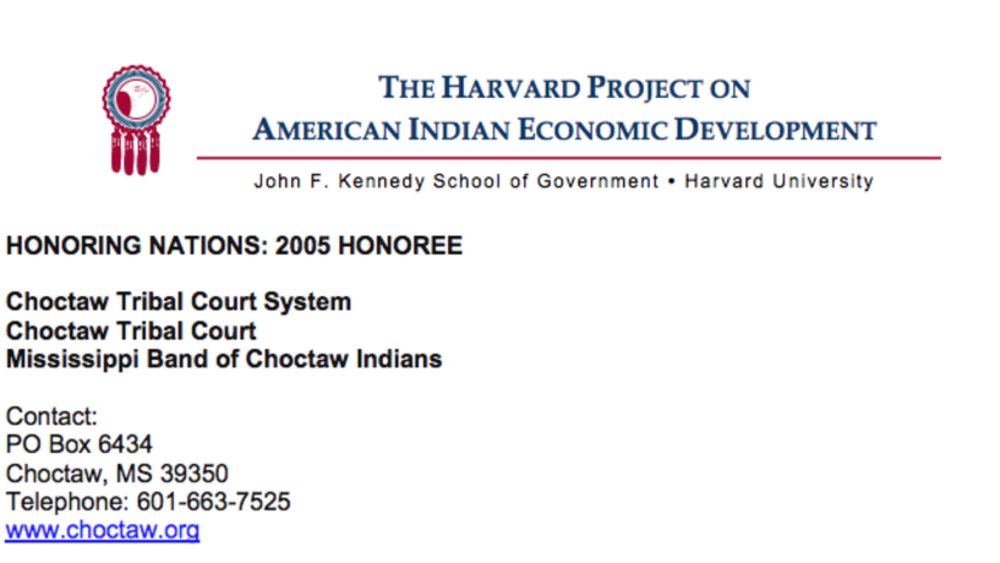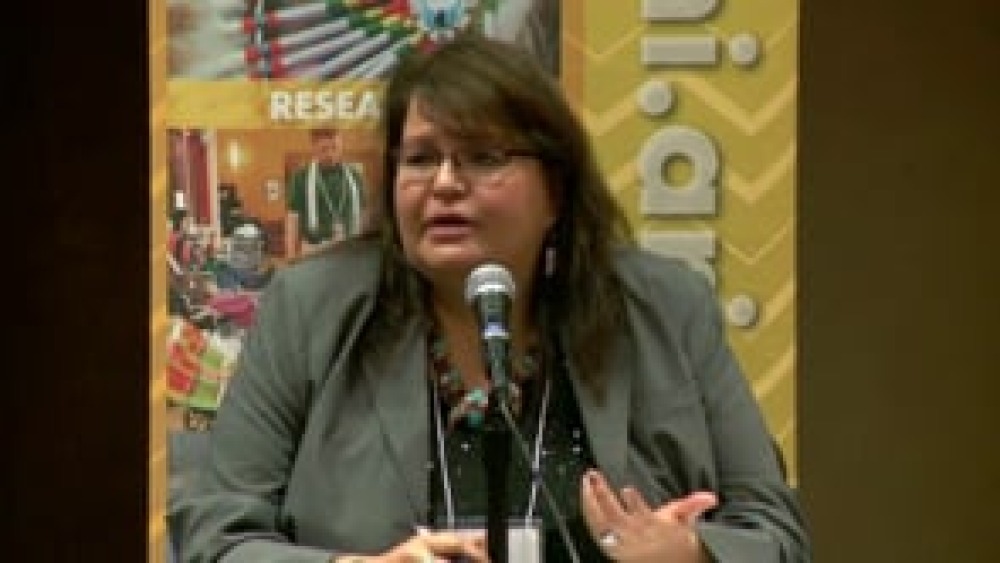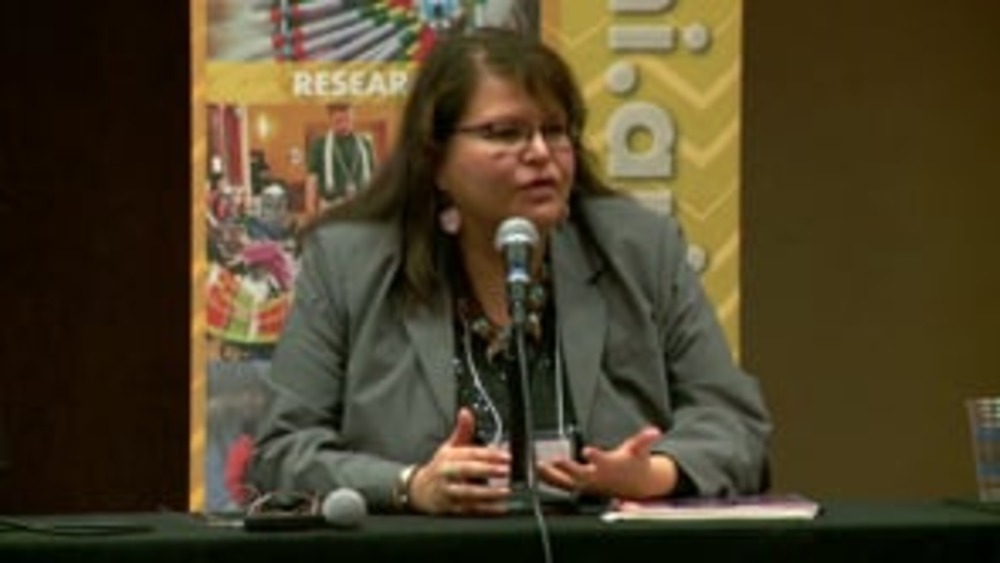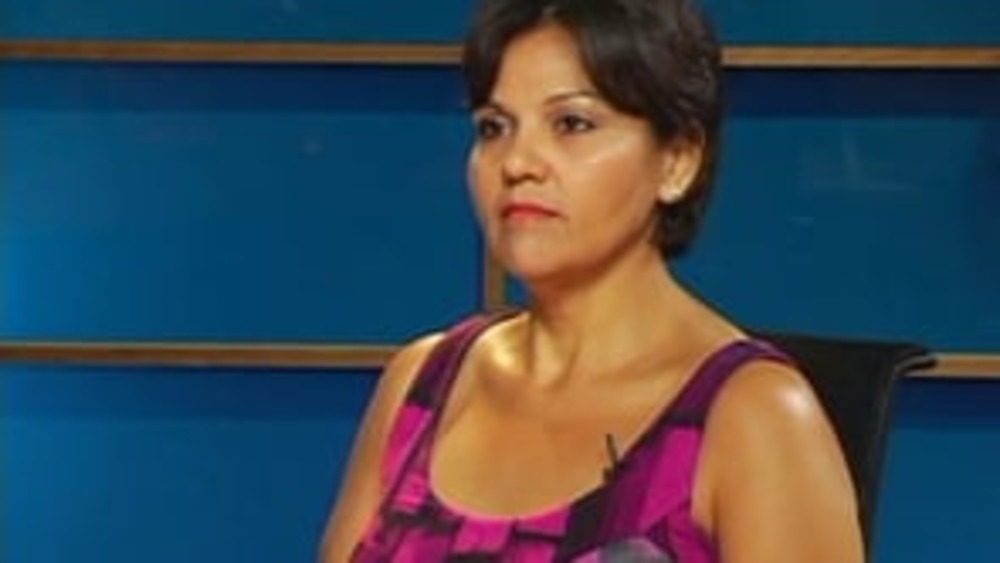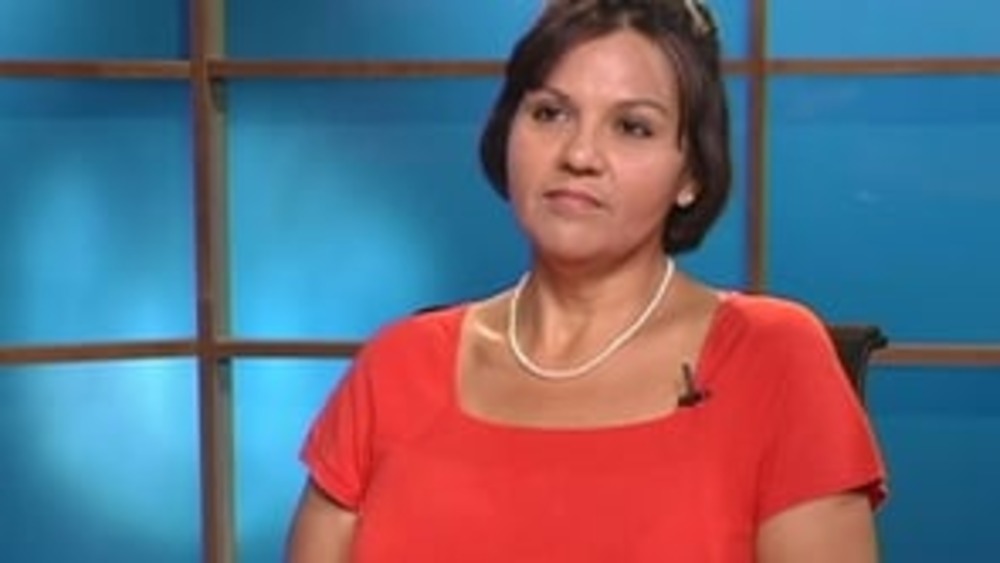Rae Nell Vaughn, former Chief Justice of the Mississippi Choctaw Supreme Court, discusses how justice systems are critical to Native nations' exercise of sovereignty, and sets out some key things that those systems need to have in place in order to administer justice fairly and effectively on behalf of their nations.
Additional Information
Vaughn, Rae Nell. "So What's So Important About Tribal Courts?" Emerging Leaders seminar. Native Nations Institute for Leadership, Management, and Policy, University of Arizona. Tucson, Arizona. November 7, 2013. Presentation.
Transcript
Rae Nell Vaughn:
"[Choctaw language]. Good morning. And I want to thank my brother from Oklahoma for the fine music and words. [Choctaw language]. Thank you. My name is Rae Nell Vaughn as Ron [Trosper] has said and I promise, I am 21. I've worked for the tribe for many, many years in different capacities; however, this capacity as serving as a judge was the most life-changing experience and enlightening moment for me. I served as a judge for 11 years and let me tell you, I definitely came in -- as I heard from one of our colleagues yesterday -- with rose-colored glasses on.
I remember the day when one of the judges came in, and at that time I was working with the Archives Department for the tribe, and she said, "˜Come out here and talk with me for a minute.' So we stepped outside on the patio and she said, "˜Rae, what do you think about being a judge?' I was very stunned at the moment. "˜A judge? What? Are you kidding me? I can barely make a decision for myself let alone for anybody else.' And the conversation went from there. I spoke with my mother and I spoke with my grandmother and my family at that time to talk about --- and of course she was being serious -- and to talk about whether this was the path I wanted to take. No one grows up saying, "˜I want to be a judge, that's what I want to be.' I remember -- she did -- I remember talking with my children and I said, "˜It just...it was on my path.' I just didn't know that it was on my path, but did I know that I was going in that direction?
In hindsight, yes, I see all the signs of where I was going that eventually led me there and gave me the opportunity for the experience, and then building on that experience, allowing me the opportunity to work within the executive branch. And so I say that to say that a lot of the conversations I've been listening to yesterday really validate a lot of the things that I have learned throughout my career and my years of working for the tribe. And let me tell you, it's a struggle at times when you're working for your own tribe, because there's always a tendency...and I know a lot of us have a lot of war stories, I'm sure many of you do, of how there's this sense of you're more on the cross than not, especially with your council, especially with your leadership, your local leadership and it's just almost like, "˜Why am I doing this? Why am I doing this?' But at the end of the day, we know that we're doing this for our future, for our children, just as our grandparents and our great grandparents did for us.
And it's amazing as Ron shared with us his experience with Chief [Phillip] Martin, I had the great fortune of being present, of seeing the evolution of the Mississippi Band of Choctaw Indians, of Mississippi Choctaw from a point of where there was poverty and then a period of prosperity, and like every society of a rise and fall and of a dark period of leadership. So we've had the experience that many tribes have also gone through too, and now we're in another period of our history, of a renaissance, of a new leader rising. We were fortunate to have Phillip Martin, the late Phillip Martin, who passed away a couple of years ago, for over 40 years of leadership and it was an amazing time of vision and of moving forward. And at the time of his...of not being reelected, we had a new leader, and unfortunately that leader chose to lead from a base of fear and created a lot of dissention and it causes people...you get angry because you want your government to succeed, and it caused people to step forward...causes people to step forward, because you know what's right.
So what I'd like to do at this time is talk with you about tribal courts and its role in tribal government and its importance, how it's important for you as leaders to understand the role and the capacity of the court. And there's one thing I will tell you that I have learned and you'd think I would have got that a long time ago, but how your economic development and your court systems, they have to run parallel. If you're wanting to move forward, those things you run parallel.
So let's go ahead and take a look at this slide presentation. And I apologize, I don't have the glitzy slide presentation that Dr. Ian [Record] had. I really like his, it was just zooming and moving about and I only have 30 minutes and Renee [Goldtooth] is going to [be] popping that sign up at me so I'm going to go quickly so that I can allow my co-presenter to present as well. And for those of you who don't recognize it, I love to talk. I love to talk.
Our first question is what role do or should Native nation justice systems play in Native nation rebuilding? Well, the key role I think is that it exercises sovereignty, the pure exercise of sovereignty. You as a government have the right and can exercise it and develop a court system. The Mississippi Band of Choctaw Indians operated under a BIA [Bureau of Indian Affairs] court until the early "˜70s. It was around 1974, '75 when the tribe then took over the tribal court system and it was a very small court, still funded by BIA of course, but we had a special judge who was non-Indian, a law trained attorney, and then we had the tribal judge and we had one clerk. And at that time our population was maybe about 3,000 people, not a very large population. We were still having issues of the local govern...the local law enforcement reaching our lands and coming in. I can vividly remember a time during our Choctaw Fair, which is held in July, of the paddy wagon coming by and we saw...I remember clearly seeing a tribal member sitting in that patty wagon. He was intoxicated and the county police had come and scooped him up and took him out, just did it. And then we began working towards taking on our own systems.
What key components do these justice systems need to possess? Law. How do we define law? We talk about an organic document of law and document can be subjective, written or unwritten. You need customary law, you may need or may not need a written constitution, ordinance and codes and common law, very basic. We have made points to ensure that we interweave tribal law, Choctaw law. Some tribes are very fortunate to have and to maintain and to practice their customary law. Unfortunately for Choctaw, a lot of things were not written or were not passed down as they should have been, but there are key elements that we do follow, values, Choctaw values that we do maintain, but not to the extent of some of the tribes that I know that were fortunate enough to be able to continue their practice. I think a lot of the tribes east of the Mississippi encountered these types of things. But again, those are the key things that these systems need to possess.
Why is it important that justice systems be strong and independent? Justice systems work hand in hand with the executive and legislative branches, and when I say that I say that in regards to the checks and balances of each of these branches. For Mississippi Choctaw, the tribal court is a statutory court. In their constitution, there are only two branches that are recognized, but we had gone over and beyond to ensure that there was a separation of this system. Now could they continue with a court? With it being a statutory court they could easily do away with the court, but they recognized the need of a forum of adjudication of these laws and so we continue with a court system, separate but equal.
What do strong, independent justice systems require? The very first thing, which is primary, is that you would be able to adjudicate with no political interference. Now how many of you have heard horror stories of leadership calling the judge, "˜What the beep are you doing down there? Do you know that that's my brother? We better do something about that.' And the one thing, I had never had leadership, the top leadership ever call me as a judge, but I had had a councilwoman call me and she was having issues with her children in our juvenile court and of course I'm the juvenile judge, and I said, "˜You know, it's already in the system, there's nothing that can be done. I don't think we need to have this conversation.' "˜Well, let me tell you Rae Nell, don't forget who approves your budget and your salary.' "˜Yes, ma'am, I'm very aware of who does. You are one of 16. That's who approves my budget and my salary. You are one of 16.' So I know that it's challenging as a judge, as a judicial officer when you have...when you live in the community, when you're a member of the community, it's very challenging, but we stand strong trying to maintain the integrity of the system, because I want you as a tribal member to feel confident in the system. As my co-presenter and I spoke earlier, there's always going to be a winner and there'll always be a loser. That's the name of the game. There's no...there's not going to be any way where both of you are going to come out on top, it just is not going to happen. I shared with one person, "˜If you don't like what's happening in court, don't get yourself there. Don't put yourself there.'
Secondly, to have the ability to appoint or elect qualified tribal members to serve as judges, and this is a work in progress I know for many, many tribes. We have on our bench currently two tribal members who have their juris doctorate. Our supreme court has two non-member associate justices who have their JD. So we're working towards those ends, of changing the bench, the structure of the bench in order to have law trained judges.
Thirdly, a canon of ethics, that should be a given. I've always shared with our judges when we go over the canon of ethics, "˜It's there to protect you. It's there to protect you.' You always have all these different forces coming at you and to say, "˜No, I can't do that, it's a conflict of interest, it's an appearance of impropriety.' 'This is what it looks like, if it's a duck... What's the saying, "˜If it quacks, if it swims, if it does... it's a duck. A duck is a duck.''
How has your nation remade, how is it remaking its justice system to more effectively resolve disputes? Well, they need qualified personnel. That's for sure. Our code is very broad in its qualifications. However, as I said, it's an evolving process where we're working towards trying to get the best personnel on staff and that's not just the judges itself, it's the support staff. It's your clerks, it's your probation officers, it's your advocates, your lay advocates. Everyone that's involved in that system, you're wanting folks who are coming in qualified in the sense of training, experience, what it is they're bringing to the table and enhancing those skills.
Financial resources. Have you ever been in a position where you're like looking at the budget and "˜Hmm, are we going to make it to the end of the year?,' because you had that one particular case that ate up your transcription fees, that you're having to provide outside counsel for and you're like, "˜This is that big case that really damages the budget, just blows it clean out of the water.' That's where your relationship with the executive and legislative is important in the sense of the administration of justice, ensuring that you have the adequate finances to operate the system because there is an administrative part to your judiciary.
Interdependence, again, talking about the checks and balances and making sure that you have these clean relationships, because you do have to have a relationship with your executive and you do have to have a relationship with your legislative body, but to understand where these boundaries are and of what you can talk about. It's very easy to have a conversation and we're talking about a code section and everything and then the conversation goes into a particular case over an issue that's happening in the community and you're like, "˜Whoa, wait a minute, we can't go there, we can't have that talk right now.' But those conversations of the administration, of their support, those are things that you need to have and it's a balancing act, it truly is a balancing act.
So how do we maintain law and order? Well, for Mississippi Choctaw, the system as I said earlier is a much bigger system than the judiciary itself. We have court services and under the Department of Court Services you have the probation office and you have teen court. Teen court -- for those of you who are not familiar -- is a forum that's available to our juvenile delinquents after they've been found delinquent to give them an opportunity to have their sentencing given to them by their peers and it's a very enlightening process. It also gives those young people, individuals to actually see how the system works. All of the positions in a teen court setting are held by young people except for the adjudicator, the judge, which is one of the judges minus the judge that heard the case who would sit and preside over this.
And I know the very first case that they held when we began operating the teen court, they wanted this juvenile delinquent to stand on the corner with a big sign saying that this is the crime that he committed, they wanted 1,000 hours of community service work. They were just like slamming him because of the vandalism and the offense that he committed and the message that we were trying to share with our youth is that, "˜Yes, this juvenile delinquent committed an offense against a person,' but it's more than that. It's committing an offense against the entire tribe, the effect of it, from the individual and the effect that it has on that individual, the rippling effect. So it's not just one person that you're committing a crime against, it's circular, it comes right back to you as a member, a member of the tribe, a member of the community.
And then we have also other agencies that provide support to the court system. We have a victim's advocacy department or program. We have a children's advocacy program. We also rely heavily on behavioral health to participate as especially with children in need of care, to help get our families reunified. And then of course we have the healing-to-wellness court. How many of you have a Healing to Wellness Court or are aware of a healing-to-wellness court, aka drug court? I see one hand, I see two hands. It's been a very successful, for Choctaw, a very successful forum. I think all of us recognize that we do have to look at other forums to help our people. It's easy to say, "˜Well, okay, let's just find them guilty and put them in jail and let's fine them,' and then they're back again, and then they're back again because we're dealing with these symptoms, we're not really getting into the root of what's going on. And so this has been a very valuable tool for us to utilize. Also it pulls in a number of the agencies that we have available to help us help this individual help themselves.
We look at how we reflect, promote our line with our people's cultural values and why these efforts are so important. Again, it's bringing in the Choctaw values. What's Choctaw? I am a tribal member, I sit on that bench and -- I sat on that bench -- and I would listen and you take it all in and I'm able to as a tribal member, as a member of that community to be able to decipher all of this and I'm able to weigh in on, "˜What is the best path for this person?' We have a traditional form of court, which is the Iti-Kana-Ikbi, to make new again, loosely translated "˜to make new again.' I had the good fortune of meeting the former [Navajo Nation Supreme Court] Chief Justice Robert Yazzie at the very beginning of my judicial career back in 1997. A number of us who were newly appointed had the opportunity to go out to Navajo Nation and to learn, and let me tell you it was a very learning experience, meeting the chief justice and meeting with their traditional court and having great dialogue as to how you create a good system, a great system. And I'm very appreciative of the opportunities that we were able to take to sit in in a court that has a record and had a lot of things going on.
What are the other efforts? It's bringing tribal member personnel in because there's an investment there, wouldn't you agree? It's an investment having your own people working your system because that's the goal. Ultimately, for all of us as tribes, that's the goal, us as tribes, as villages, as pueblos. You want your membership running your government. That's ultimately what we all strive for. Also identifying tribal member mentors and this could be our elders, this could be people who come in with a wide range of experiences to help us with shadowing, job shadowing, having someone to talk to. I think earlier yesterday I think someone talked about they felt good about being able to finally talk with someone about this, this case, this issue, how do I resolve it. And as I said throughout this presentation, it's important to interweave your customary law, your customary values with western jurisprudence, how we make that happen, 'Choctaw-ize' it as one of my mentors always said, 'Choctaw-ize' it.
What role does your nation's justice system play in protecting, strengthening and expanding your nation's sovereignty in advancing its nation building priorities? As I stated earlier, to provide financial resources, to create and support the judiciary and the Choctaw legal community. And when I say Choctaw legal community, our tribe has made the investment of not only supporting a judicial system, but we also have an Office of the Attorney General. On the flip side of that we also have a Department of Legal Assistance, which is available for the tribal...the individual tribal member. We also have available lay advocates who come in and also practice in our court. Secondly, the respect of other judicial systems, local and federal. How many times have you heard, "˜Oh, that kangaroo court'? "˜That kangaroo court.' I have heard that so many times. Have you heard that, "˜That kangaroo court?' Have you been..."
Eldena Bear Don't Walk:
"All the time."
Rae Nell Vaughn:
"All the time. It was never tribal court, it's that kangaroo court. Well, I didn't realize that we were a bunch of animals, but okay. "˜That kangaroo court can never make a decision, it was never stable, it was up and down, depended on who was leadership, you just never knew what was going to come out of there and how the heck did they come up with that decision. That kangaroo court.' That's where we need to work. And unfortunately in Indian Country, there are those systems that don't have the support or do have interference and aren't able to have the credibility and the respect of the membership.
When I say the confidence of companies to do business with the Choctaw courts by entering into contract with the tribe, what I'm saying here is that, as I stated earlier with economic development, if you have a company that is wanting to come in and do business with your tribe, the first thing they're going to ask is, "˜Okay, if we have a dispute, where are we settling it? Do they have codes? What is the law? What's the rules to the game?' And so it's important to ensure that you have those things in place. Choctaw has a mirrored UCC [uniform commercial] code that it adopted back in early 2000, a number of codes that give us the ability to do business.
And of course then there was the establishment of the Supreme Court. I spoke earlier about the inception of the tribe taking over the court and at that point we were a membership of 3,000 and we had the special judge and then we had a tribal judge and then we had a clerk. Well, as the tribe began to grow in population and economically, the leadership then saw the need to strengthen and expand the system, and then in 1997 -- and I'll back up a little bit -- in 1994 we opened our casino. So what does that mean? Boom, the economics jumped up. You had people coming on to the reservation, customers coming in, you had a lot more vendors coming into the reservation, you had a lot of other things happening on the reservation as well. So the tribe chose to reorganize the system and expand it into four individual divisions with a senior judge and associate judge. We were still operating with the lower-level court and setting up an appeal process that would allow the judges that were not involved in the case that was coming up for appeal to sit as arbitrators for an appeal. Well, that wasn't really working well.
So in mid 2000, they chose to establish a Supreme Court and this Supreme Court was made up of three judges who did not participate at the lower court, they wanted to ensure that there was Choctaw values, a Choctaw voice in there so they require a tribal member who met the qualifications of the lower court plus years of experience on the judiciary and to have the associates who sat with the chief justice to be law-trained. And it was a system that worked out very well. On the other side of that, they chose in administrating the judiciary to allow the chief justice to serve as the administrator and there's some pros and cons with that as well. Ultimately, at the end, prior to my leaving the bench, I was operating a court with a budget of $3.5 million and I had 32 staff under me that I supervised. So it shows you the evolution of the system and again it's a growing system.
Ladies and gentlemen, court systems are important and it requires support and it requires attention and it requires the type of people, good people to sit on the bench and to be an adjudicator and to render decisions that are going to be in the best interest of the people, because as you know it's collective, it's for the entire tribe.
And so I thank you for the opportunity. I'm going to now turn it over to my co-presenter and I think we will have questions and answers after her presentation. Thank you."

